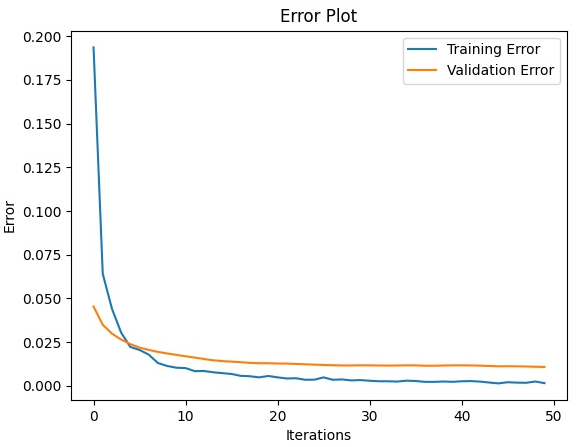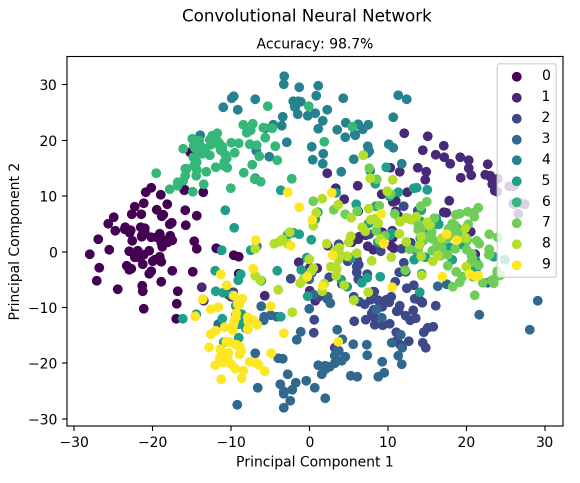【python实现卷积神经网络】开始训练
代码来源:https://github.com/eriklindernoren/ML-From-Scratch
卷积神经网络中卷积层Conv2D(带stride、padding)的具体实现:https://www.cnblogs.com/xiximayou/p/12706576.html
激活函数的实现(sigmoid、softmax、tanh、relu、leakyrelu、elu、selu、softplus):https://www.cnblogs.com/xiximayou/p/12713081.html
损失函数定义(均方误差、交叉熵损失):https://www.cnblogs.com/xiximayou/p/12713198.html
优化器的实现(SGD、Nesterov、Adagrad、Adadelta、RMSprop、Adam):https://www.cnblogs.com/xiximayou/p/12713594.html
卷积层反向传播过程:https://www.cnblogs.com/xiximayou/p/12713930.html
全连接层实现:https://www.cnblogs.com/xiximayou/p/12720017.html
批量归一化层实现:https://www.cnblogs.com/xiximayou/p/12720211.html
池化层实现:https://www.cnblogs.com/xiximayou/p/12720324.html
padding2D实现:https://www.cnblogs.com/xiximayou/p/12720454.html
Flatten层实现:https://www.cnblogs.com/xiximayou/p/12720518.html
上采样层UpSampling2D实现:https://www.cnblogs.com/xiximayou/p/12720558.html
Dropout层实现:https://www.cnblogs.com/xiximayou/p/12720589.html
激活层实现:https://www.cnblogs.com/xiximayou/p/12720622.html
定义训练和测试过程:https://www.cnblogs.com/xiximayou/p/12725873.html
代码在mlfromscratch/examples/convolutional_neural_network.py 中:
from __future__ import print_function
from sklearn import datasets
import matplotlib.pyplot as plt
import math
import numpy as np # Import helper functions
from mlfromscratch.deep_learning import NeuralNetwork
from mlfromscratch.utils import train_test_split, to_categorical, normalize
from mlfromscratch.utils import get_random_subsets, shuffle_data, Plot
from mlfromscratch.utils.data_operation import accuracy_score
from mlfromscratch.deep_learning.optimizers import StochasticGradientDescent, Adam, RMSprop, Adagrad, Adadelta
from mlfromscratch.deep_learning.loss_functions import CrossEntropy
from mlfromscratch.utils.misc import bar_widgets
from mlfromscratch.deep_learning.layers import Dense, Dropout, Conv2D, Flatten, Activation, MaxPooling2D
from mlfromscratch.deep_learning.layers import AveragePooling2D, ZeroPadding2D, BatchNormalization, RNN def main(): #----------
# Conv Net
#---------- optimizer = Adam() data = datasets.load_digits()
X = data.data
y = data.target # Convert to one-hot encoding
y = to_categorical(y.astype("int")) X_train, X_test, y_train, y_test = train_test_split(X, y, test_size=0.4, seed=1) # Reshape X to (n_samples, channels, height, width)
X_train = X_train.reshape((-1,1,8,8))
X_test = X_test.reshape((-1,1,8,8)) clf = NeuralNetwork(optimizer=optimizer,
loss=CrossEntropy,
validation_data=(X_test, y_test)) clf.add(Conv2D(n_filters=16, filter_shape=(3,3), stride=1, input_shape=(1,8,8), padding='same'))
clf.add(Activation('relu'))
clf.add(Dropout(0.25))
clf.add(BatchNormalization())
clf.add(Conv2D(n_filters=32, filter_shape=(3,3), stride=1, padding='same'))
clf.add(Activation('relu'))
clf.add(Dropout(0.25))
clf.add(BatchNormalization())
clf.add(Flatten())
clf.add(Dense(256))
clf.add(Activation('relu'))
clf.add(Dropout(0.4))
clf.add(BatchNormalization())
clf.add(Dense(10))
clf.add(Activation('softmax')) print ()
clf.summary(name="ConvNet") train_err, val_err = clf.fit(X_train, y_train, n_epochs=50, batch_size=256) # Training and validation error plot
n = len(train_err)
training, = plt.plot(range(n), train_err, label="Training Error")
validation, = plt.plot(range(n), val_err, label="Validation Error")
plt.legend(handles=[training, validation])
plt.title("Error Plot")
plt.ylabel('Error')
plt.xlabel('Iterations')
plt.show() _, accuracy = clf.test_on_batch(X_test, y_test)
print ("Accuracy:", accuracy) y_pred = np.argmax(clf.predict(X_test), axis=1)
X_test = X_test.reshape(-1, 8*8)
# Reduce dimension to 2D using PCA and plot the results
Plot().plot_in_2d(X_test, y_pred, title="Convolutional Neural Network", accuracy=accuracy, legend_labels=range(10)) if __name__ == "__main__":
main()
我们还是一步步进行分析:
1、优化器使用Adam()
2、数据集使用的是sklearn.datasets中的手写数字,其部分数据如下:
(1797, 64)
(1797,)
[[ 0. 0. 5. 13. 9. 1. 0. 0. 0. 0. 13. 15. 10. 15. 5. 0. 0. 3.
15. 2. 0. 11. 8. 0. 0. 4. 12. 0. 0. 8. 8. 0. 0. 5. 8. 0.
0. 9. 8. 0. 0. 4. 11. 0. 1. 12. 7. 0. 0. 2. 14. 5. 10. 12.
0. 0. 0. 0. 6. 13. 10. 0. 0. 0.]
[ 0. 0. 0. 12. 13. 5. 0. 0. 0. 0. 0. 11. 16. 9. 0. 0. 0. 0.
3. 15. 16. 6. 0. 0. 0. 7. 15. 16. 16. 2. 0. 0. 0. 0. 1. 16.
16. 3. 0. 0. 0. 0. 1. 16. 16. 6. 0. 0. 0. 0. 1. 16. 16. 6.
0. 0. 0. 0. 0. 11. 16. 10. 0. 0.]
[ 0. 0. 0. 4. 15. 12. 0. 0. 0. 0. 3. 16. 15. 14. 0. 0. 0. 0.
8. 13. 8. 16. 0. 0. 0. 0. 1. 6. 15. 11. 0. 0. 0. 1. 8. 13.
15. 1. 0. 0. 0. 9. 16. 16. 5. 0. 0. 0. 0. 3. 13. 16. 16. 11.
5. 0. 0. 0. 0. 3. 11. 16. 9. 0.]
[ 0. 0. 7. 15. 13. 1. 0. 0. 0. 8. 13. 6. 15. 4. 0. 0. 0. 2.
1. 13. 13. 0. 0. 0. 0. 0. 2. 15. 11. 1. 0. 0. 0. 0. 0. 1.
12. 12. 1. 0. 0. 0. 0. 0. 1. 10. 8. 0. 0. 0. 8. 4. 5. 14.
9. 0. 0. 0. 7. 13. 13. 9. 0. 0.]
[ 0. 0. 0. 1. 11. 0. 0. 0. 0. 0. 0. 7. 8. 0. 0. 0. 0. 0.
1. 13. 6. 2. 2. 0. 0. 0. 7. 15. 0. 9. 8. 0. 0. 5. 16. 10.
0. 16. 6. 0. 0. 4. 15. 16. 13. 16. 1. 0. 0. 0. 0. 3. 15. 10.
0. 0. 0. 0. 0. 2. 16. 4. 0. 0.]
[ 0. 0. 12. 10. 0. 0. 0. 0. 0. 0. 14. 16. 16. 14. 0. 0. 0. 0.
13. 16. 15. 10. 1. 0. 0. 0. 11. 16. 16. 7. 0. 0. 0. 0. 0. 4.
7. 16. 7. 0. 0. 0. 0. 0. 4. 16. 9. 0. 0. 0. 5. 4. 12. 16.
4. 0. 0. 0. 9. 16. 16. 10. 0. 0.]
[ 0. 0. 0. 12. 13. 0. 0. 0. 0. 0. 5. 16. 8. 0. 0. 0. 0. 0.
13. 16. 3. 0. 0. 0. 0. 0. 14. 13. 0. 0. 0. 0. 0. 0. 15. 12.
7. 2. 0. 0. 0. 0. 13. 16. 13. 16. 3. 0. 0. 0. 7. 16. 11. 15.
8. 0. 0. 0. 1. 9. 15. 11. 3. 0.]
[ 0. 0. 7. 8. 13. 16. 15. 1. 0. 0. 7. 7. 4. 11. 12. 0. 0. 0.
0. 0. 8. 13. 1. 0. 0. 4. 8. 8. 15. 15. 6. 0. 0. 2. 11. 15.
15. 4. 0. 0. 0. 0. 0. 16. 5. 0. 0. 0. 0. 0. 9. 15. 1. 0.
0. 0. 0. 0. 13. 5. 0. 0. 0. 0.]
[ 0. 0. 9. 14. 8. 1. 0. 0. 0. 0. 12. 14. 14. 12. 0. 0. 0. 0.
9. 10. 0. 15. 4. 0. 0. 0. 3. 16. 12. 14. 2. 0. 0. 0. 4. 16.
16. 2. 0. 0. 0. 3. 16. 8. 10. 13. 2. 0. 0. 1. 15. 1. 3. 16.
8. 0. 0. 0. 11. 16. 15. 11. 1. 0.]
[ 0. 0. 11. 12. 0. 0. 0. 0. 0. 2. 16. 16. 16. 13. 0. 0. 0. 3.
16. 12. 10. 14. 0. 0. 0. 1. 16. 1. 12. 15. 0. 0. 0. 0. 13. 16.
9. 15. 2. 0. 0. 0. 0. 3. 0. 9. 11. 0. 0. 0. 0. 0. 9. 15.
4. 0. 0. 0. 9. 12. 13. 3. 0. 0.]]
[0 1 2 3 4 5 6 7 8 9]
3、接着有一个to_categorical()函数,在mlfromscratch.utils下的data_manipulation.py中:
def to_categorical(x, n_col=None):
""" One-hot encoding of nominal values """
if not n_col:
n_col = np.amax(x) + 1
one_hot = np.zeros((x.shape[0], n_col))
one_hot[np.arange(x.shape[0]), x] = 1
return one_hot
用于将标签转换为one-hot编码。
4、划分训练集和测试集:train_test_split(),在mlfromscratch.utils下的data_manipulation.py中:
def train_test_split(X, y, test_size=0.5, shuffle=True, seed=None):
""" Split the data into train and test sets """
if shuffle:
X, y = shuffle_data(X, y, seed)
# Split the training data from test data in the ratio specified in
# test_size
split_i = len(y) - int(len(y) // (1 / test_size))
X_train, X_test = X[:split_i], X[split_i:]
y_train, y_test = y[:split_i], y[split_i:] return X_train, X_test, y_train, y_test
5、由于卷积神经网络的输入是[batchsize,channel,wheight,width]的维度,因此要将原始数据进行转换,即将(1797,64)转换为(1797,1,8,8)格式的数据。这里batchsize就是样本的数量。
6、定义卷积神经网络的训练和测试过程:包括优化器、损失函数、测试数据
7、定义模型结构
8、输出模型每层的类型、参数数量以及输出大小
9、将数据输入到模型中,设置epochs的大小以及batch_size的大小
10、计算训练和测试的错误,并绘制成图
11、计算准确率
12、绘制测试集中每一类预测的结果,这里有一个plot_in_2d()函数,位于mlfromscratch.utils下的misc.py中
# Plot the dataset X and the corresponding labels y in 2D using PCA.
def plot_in_2d(self, X, y=None, title=None, accuracy=None, legend_labels=None):
X_transformed = self._transform(X, dim=2)
x1 = X_transformed[:, 0]
x2 = X_transformed[:, 1]
class_distr = [] y = np.array(y).astype(int) colors = [self.cmap(i) for i in np.linspace(0, 1, len(np.unique(y)))] # Plot the different class distributions
for i, l in enumerate(np.unique(y)):
_x1 = x1[y == l]
_x2 = x2[y == l]
_y = y[y == l]
class_distr.append(plt.scatter(_x1, _x2, color=colors[i])) # Plot legend
if not legend_labels is None:
plt.legend(class_distr, legend_labels, loc=1) # Plot title
if title:
if accuracy:
perc = 100 * accuracy
plt.suptitle(title)
plt.title("Accuracy: %.1f%%" % perc, fontsize=10)
else:
plt.title(title) # Axis labels
plt.xlabel('Principal Component 1')
plt.ylabel('Principal Component 2') plt.show()
接下来就可以实际进行操作了,我是在谷歌colab中,首先使用:
!git clone https://github.com/eriklindernoren/ML-From-Scratch.git
将相关代码复制下来。
然后进行安装:在ML-From-Scratch目录下输入:
!python setup.py install
最后输入:
!python mlfromscratch/examples/convolutional_neural_network.py
最终结果:
+---------+
| ConvNet |
+---------+
Input Shape: (1, 8, 8)
+----------------------+------------+--------------+
| Layer Type | Parameters | Output Shape |
+----------------------+------------+--------------+
| Conv2D | 160 | (16, 8, 8) |
| Activation (ReLU) | 0 | (16, 8, 8) |
| Dropout | 0 | (16, 8, 8) |
| BatchNormalization | 2048 | (16, 8, 8) |
| Conv2D | 4640 | (32, 8, 8) |
| Activation (ReLU) | 0 | (32, 8, 8) |
| Dropout | 0 | (32, 8, 8) |
| BatchNormalization | 4096 | (32, 8, 8) |
| Flatten | 0 | (2048,) |
| Dense | 524544 | (256,) |
| Activation (ReLU) | 0 | (256,) |
| Dropout | 0 | (256,) |
| BatchNormalization | 512 | (256,) |
| Dense | 2570 | (10,) |
| Activation (Softmax) | 0 | (10,) |
+----------------------+------------+--------------+
Total Parameters: 538570 Training: 100% [------------------------------------------------] Time: 0:01:32
<Figure size 640x480 with 1 Axes>
Accuracy: 0.9846796657381616
<Figure size 640x480 with 1 Axes>


至此,结合代码一步一步看卷积神经网络的整个实现过程就完成了。通过结合代码的形式,可以加深对深度学习中卷积神经网络相关知识的理解。
【python实现卷积神经网络】开始训练的更多相关文章
- 基于Python的卷积神经网络和特征提取
基于Python的卷积神经网络和特征提取 用户1737318发表于人工智能头条订阅 224 在这篇文章中: Lasagne 和 nolearn 加载MNIST数据集 ConvNet体系结构与训练 预测 ...
- 《TensorFlow实战》中AlexNet卷积神经网络的训练中
TensorFlow实战中AlexNet卷积神经网络的训练 01 出错 TypeError: as_default() missing 1 required positional argument: ...
- python机器学习卷积神经网络(CNN)
卷积神经网络(CNN) 关注公众号"轻松学编程"了解更多. 一.简介 卷积神经网络(Convolutional Neural Network,CNN)是一种前馈神经网络,它的人 ...
- 【python实现卷积神经网络】定义训练和测试过程
代码来源:https://github.com/eriklindernoren/ML-From-Scratch 卷积神经网络中卷积层Conv2D(带stride.padding)的具体实现:https ...
- Python CNN卷积神经网络代码实现
# -*- coding: utf-8 -*- """ Created on Wed Nov 21 17:32:28 2018 @author: zhen "& ...
- 使用卷积神经网络CNN训练识别mnist
算的的上是自己搭建的第一个卷积神经网络.网络结构比较简单. 输入为单通道的mnist数据集.它是一张28*28,包含784个特征值的图片 我们第一层输入,使用5*5的卷积核进行卷积,输出32张特征图, ...
- 【python实现卷积神经网络】卷积层Conv2D反向传播过程
代码来源:https://github.com/eriklindernoren/ML-From-Scratch 卷积神经网络中卷积层Conv2D(带stride.padding)的具体实现:https ...
- 【python实现卷积神经网络】激活函数的实现(sigmoid、softmax、tanh、relu、leakyrelu、elu、selu、softplus)
代码来源:https://github.com/eriklindernoren/ML-From-Scratch 卷积神经网络中卷积层Conv2D(带stride.padding)的具体实现:https ...
- 【python实现卷积神经网络】损失函数的定义(均方误差损失、交叉熵损失)
代码来源:https://github.com/eriklindernoren/ML-From-Scratch 卷积神经网络中卷积层Conv2D(带stride.padding)的具体实现:https ...
随机推荐
- Python3学习之路~10.1 多进程、进程间通信、进程池
一 多进程multiprocessing multiprocessing is a package that supports spawning processes using an API simi ...
- 15. 获取类路径下文件对应的输入流(inputStream)方式
//获取 inputStream 方式一Resource resource = new ClassPathResource("excel/template/test.xlsx"); ...
- 我的Keras使用总结(2)——构建图像分类模型(针对小数据集)
Keras基本的使用都已经清楚了,那么这篇主要学习如何使用Keras进行训练模型,训练训练,主要就是“练”,所以多做几个案例就知道怎么做了. 在本文中,我们将提供一些面向小数据集(几百张到几千张图片) ...
- springcloud基础-eureka(注册中心)案例
一.新建项目,取名eureka-server pom.xml <?xml version="1.0" encoding="UTF-8"?> < ...
- c# winform 访问WebServices 服务(通过WEB引用的方式进行访问)
第一步.Winform项目引用WEB服务 第二步.代码声明实例化 Web引用 YzServ.TestServ yzserv = new WebYzServ.TestServ(); yzserv.AAA ...
- STL篇--list容器
list容器: 1.list 容器 的本质就是双向环形链表,最后一个节点刻意做成空节点,符合容器的左闭右开的原则2.list 的迭代器 是一个智能指针,其实就是一个类,通过操作符重载模拟各种操作(++ ...
- gRPC(2):客户端创建和调用原理
1. gRPC 客户端创建流程 1.1 背景 gRPC 是在 HTTP/2 之上实现的 RPC 框架,HTTP/2 是第 7 层(应用层)协议,它运行在 TCP(第 4 层 - 传输层)协议之上,相比 ...
- Nuget多项目批量打包上传服务器的简明教程
本篇不会介绍Nuget是什么,如何打包上传Nuget包,怎么搭建私有Nuget服务器.这些问题园子里都有相应的文章分享,这里不做过多阐述.另外本文假设你已经下载了Nuget.exe,并且已经设置好了环 ...
- tcp/ip面试题
TCP协议 1.OSI与TCP/IP各层的结构和功能,协议和作用. OSI七层模型对应TCP/IP四层模型,只是分法不同而已. 应用层:提供应用层服务,文件传输(FTP),电子邮件( ...
- html之样式
HTML 样式 1. font字体 font-family 字体样式 比如:微软雅黑.Serif 字体.Sans-serif 字体.Monospace 字体.Cursive 字体.Fantasy 字体 ...
